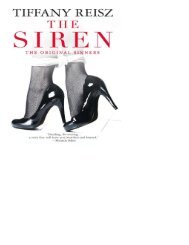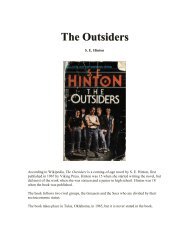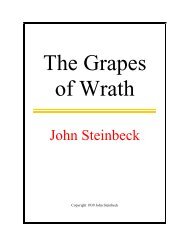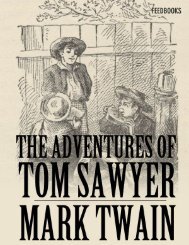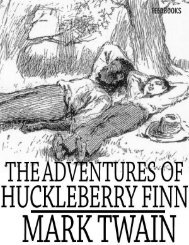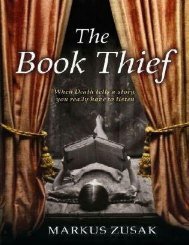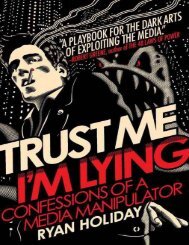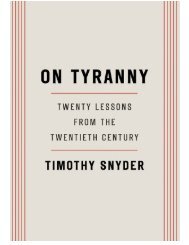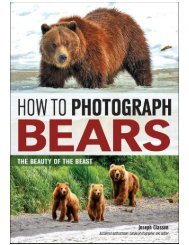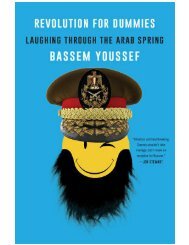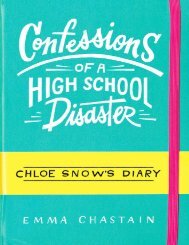- Page 4 and 5: Lilac Girls is a work of fiction. A
- Page 6: Part Two Chapter 27: Caroline Chapt
- Page 10 and 11: wasn’t work really. Loving all th
- Page 12 and 13: “We’re raising money here, Caro
- Page 14 and 15: from him or the flowers? Why didn
- Page 16 and 17: We took a cab to Le Grenier, a love
- Page 18 and 19: each other.” I fluttered at the t
- Page 22 and 23: krowki, toffee candies, for perfect
- Page 24 and 25: “He went looking for you,” Matk
- Page 26 and 27: The firefly flew behind her back, p
- Page 28 and 29: efore was still beaten quite flat.
- Page 30 and 31: 1939 At midnight, Father and I walk
- Page 32 and 33: “Ah, the surgeon,” Katz said, s
- Page 34 and 35: People gathered in the square to wa
- Page 36 and 37: You can go all the way.” “Someo
- Page 38 and 39: “You can’t keep your clothes on
- Page 40 and 41: 1939 Once Hitler invaded Poland, mi
- Page 42 and 43: called me le girafon and she ground
- Page 44 and 45: “Please. You want me to get Rena
- Page 46 and 47: smile? “I’m on my way to the th
- Page 48 and 49: 1939 Matka screamed as the SS man b
- Page 50 and 51: the cats and dogs owned by Jews. Ca
- Page 52 and 53: Wiola. “Who is it?” came a voic
- Page 54 and 55: 1939-1940 I took the train home fro
- Page 56 and 57: against the cold wooden shelf behin
- Page 58 and 59: not even standing close to me. What
- Page 60 and 61: “Man, being reasonable, must get
- Page 62 and 63: “Can we not talk about it? It sti
- Page 64 and 65: He unfastened the top button of my
- Page 66 and 67: from university had been required t
- Page 68 and 69: sidewalks, heads down against the w
- Page 70 and 71:
shop owner in the ghetto. Through t
- Page 72 and 73:
you can get food to them—” “I
- Page 74 and 75:
Candy price cards set? Check. Cashb
- Page 76 and 77:
“What time is it, Fritz?” I sai
- Page 78 and 79:
Koegel took in my short haircut. Wa
- Page 80 and 81:
“He suggested a dance…” Binz
- Page 82 and 83:
the process. It’s far more humane
- Page 84 and 85:
Hellinger entered the room with his
- Page 86 and 87:
He pulled me close and kissed my ne
- Page 88 and 89:
“Roger says it may be another mon
- Page 90 and 91:
that aching hole Mother had tried t
- Page 92 and 93:
I grabbed the phone. “Paul?” I
- Page 94 and 95:
THEY SEPARATED MEN FROM women at Lu
- Page 96 and 97:
hell.
- Page 98 and 99:
“Mother’s French is excellent.
- Page 100 and 101:
— I HAD MY ORPHAN WORK to keep me
- Page 102 and 103:
costumes.” The costumes. Yards of
- Page 104 and 105:
1941 The train doors opened, and we
- Page 106 and 107:
Next I was ordered to strip while a
- Page 108 and 109:
wooden clogs, a toothbrush, a thin
- Page 110 and 111:
Christmas morning started with a pa
- Page 112 and 113:
The chirp of Binz’s metal clicker
- Page 114 and 115:
“In bread, Madame Doctor,” she
- Page 116 and 117:
manner, no doubt a result of her Ge
- Page 118 and 119:
“Open the gate,” I said to the
- Page 120 and 121:
“Now,” I said. “That patient
- Page 122 and 123:
1941 I gripped the edge of my file
- Page 124 and 125:
Vanderbilts’ party. I’m playing
- Page 126 and 127:
“Tines not stretched. That’s go
- Page 128 and 129:
1941-1942 Binz sent me to the bunke
- Page 130 and 131:
hazelnut—” “Stop it,” Janin
- Page 132 and 133:
too. We put on our gowns, and Janin
- Page 134 and 135:
We were all so thirsty. They’d pu
- Page 136 and 137:
“Don’t pretend you don’t care
- Page 138 and 139:
That helped. We composed a hymn to
- Page 140 and 141:
smoke and fire into the sky. The vi
- Page 142 and 143:
ibbon of red and black. The award w
- Page 144 and 145:
“Well, that makes two of us. Suhr
- Page 146 and 147:
“You know the rules. Can you clos
- Page 148 and 149:
intense dislike of the fatuous Whit
- Page 150 and 151:
“Haven’t a clue,” Betty said.
- Page 152 and 153:
cheek? “Come, dear, who are our w
- Page 154 and 155:
of climbing out of his crib. Janina
- Page 156 and 157:
Poor sweet Lou, who never hurt anyo
- Page 158 and 159:
sound in the room. “Number 7649.
- Page 160 and 161:
My first tries left puddles on the
- Page 162 and 163:
mug. When the new religion ushered
- Page 164 and 165:
CHRISTMAS 1943 Any spare time I had
- Page 166 and 167:
Mother and I caught up with Betty,
- Page 168 and 169:
CHRISTMAS 1943 Christmas of 1943 wa
- Page 170 and 171:
I was happy Zuzanna slept through i
- Page 172 and 173:
1944 “Vilmer Hartman is here to s
- Page 174 and 175:
“I report to Berlin.” “Did th
- Page 176 and 177:
“Our sources tell me news of Gebh
- Page 178 and 179:
last snowstorm had hit Bethlehem, b
- Page 180 and 181:
of Binz. Rumor was, Gemma La Guardi
- Page 182 and 183:
Nadia gasped, one fist to her chest
- Page 184 and 185:
“No, Kasia. You go.” She tried
- Page 186 and 187:
Was this really happening? Going ho
- Page 188 and 189:
1945 By April of 1945, Germany had
- Page 190 and 191:
“She had to go down to the statio
- Page 192:
weakness. Cool, clammy skin. More f
- Page 196 and 197:
stood fearless, her name in lights
- Page 198 and 199:
“Never,” I said. — I SAW PAUL
- Page 200 and 201:
and it made me smile. Men only whis
- Page 202 and 203:
place.” Paul pulled my shirt coll
- Page 204 and 205:
1945 “Am I dreaming?” Zuzanna s
- Page 206 and 207:
Felka came to us and ran back and f
- Page 208 and 209:
“It looks like it,” I said. “
- Page 210 and 211:
I am sorry. I hated those three wor
- Page 212 and 213:
“No, I don’t think you do. How
- Page 214 and 215:
1945 The next morning I woke up hun
- Page 216 and 217:
I edged closer. “I have a special
- Page 218 and 219:
as a picture. Behind them, six whit
- Page 220 and 221:
1945 The summer the year that Zuzan
- Page 222 and 223:
with shuffling papers. If I did get
- Page 224 and 225:
“How about a free class on the be
- Page 226 and 227:
1945 It couldn’t possibly be him.
- Page 228 and 229:
“You never told me what ‘Zegota
- Page 230 and 231:
of the service. Collections of blac
- Page 232 and 233:
church weddings. They considered th
- Page 234 and 235:
1947 The so-called Doctors Trial at
- Page 236 and 237:
Fritz was the only Doctors Trial de
- Page 238 and 239:
I resisted sweets since I not only
- Page 240 and 241:
cultivate beans and potatoes on the
- Page 242 and 243:
eating, it seemed—still thin but
- Page 244 and 245:
“You’re a father.” “But I l
- Page 246:
“We are at your service, Mme Vina
- Page 250 and 251:
We headed for the door. What a seri
- Page 252 and 253:
“I don’t badger anyone,” I sa
- Page 254 and 255:
Let other people in.” “Easy for
- Page 256 and 257:
him. Next to him, Leena Rodierre. H
- Page 258 and 259:
“Yes, I head up American Friends
- Page 260 and 261:
“Don’t you owe it to me? Leavin
- Page 262 and 263:
THE FOLLOWING DAY I took Rosemary G
- Page 264 and 265:
Bethlehem stamp cancellation on the
- Page 266 and 267:
Mr. Gardener led Mother’s garden
- Page 268 and 269:
I kept my eye on the woman onstage.
- Page 270 and 271:
“So far, the plan is the Rabbits
- Page 272 and 273:
1958 The day before I was scheduled
- Page 274 and 275:
DECEMBER 1958 We landed at Idlewild
- Page 276 and 277:
Gebhardt. Dr. Oberheuser. I started
- Page 278 and 279:
“I can’t do this again,” I sa
- Page 280 and 281:
“She disappeared. I don’t know
- Page 282 and 283:
signifie pas que je vais attendre.
- Page 284 and 285:
1959 The following spring we all tr
- Page 286 and 287:
I changed the subject. “I’m gla
- Page 288 and 289:
I walked along the gravel path and
- Page 290 and 291:
Caroline followed. “Sometimes we
- Page 292 and 293:
I hurried home to our apartment and
- Page 294 and 295:
“Run along and find Father,” I
- Page 296 and 297:
I brought the paper cup to my lips,
- Page 298 and 299:
1959 It took me some time to get ou
- Page 300 and 301:
“No, but if the doctor is free, I
- Page 302 and 303:
yet to touch terra firma, so many a
- Page 304 and 305:
How sure Zuzanna’s step was now t
- Page 306 and 307:
I looked at the diplomas framed on
- Page 308 and 309:
more punishment. Lots of them. Powe
- Page 310 and 311:
At long last, the story I’d waite
- Page 312 and 313:
I went to Pietrik’s bed, where he
- Page 314 and 315:
ows. “These were the Polish women
- Page 316 and 317:
lawyer Benjamin Ferencz, on behalf
- Page 318 and 319:
Many thanks to those who made writi
- Page 320 and 321:
ABOUT THE AUTHOR MARTHA HALL KELLY



